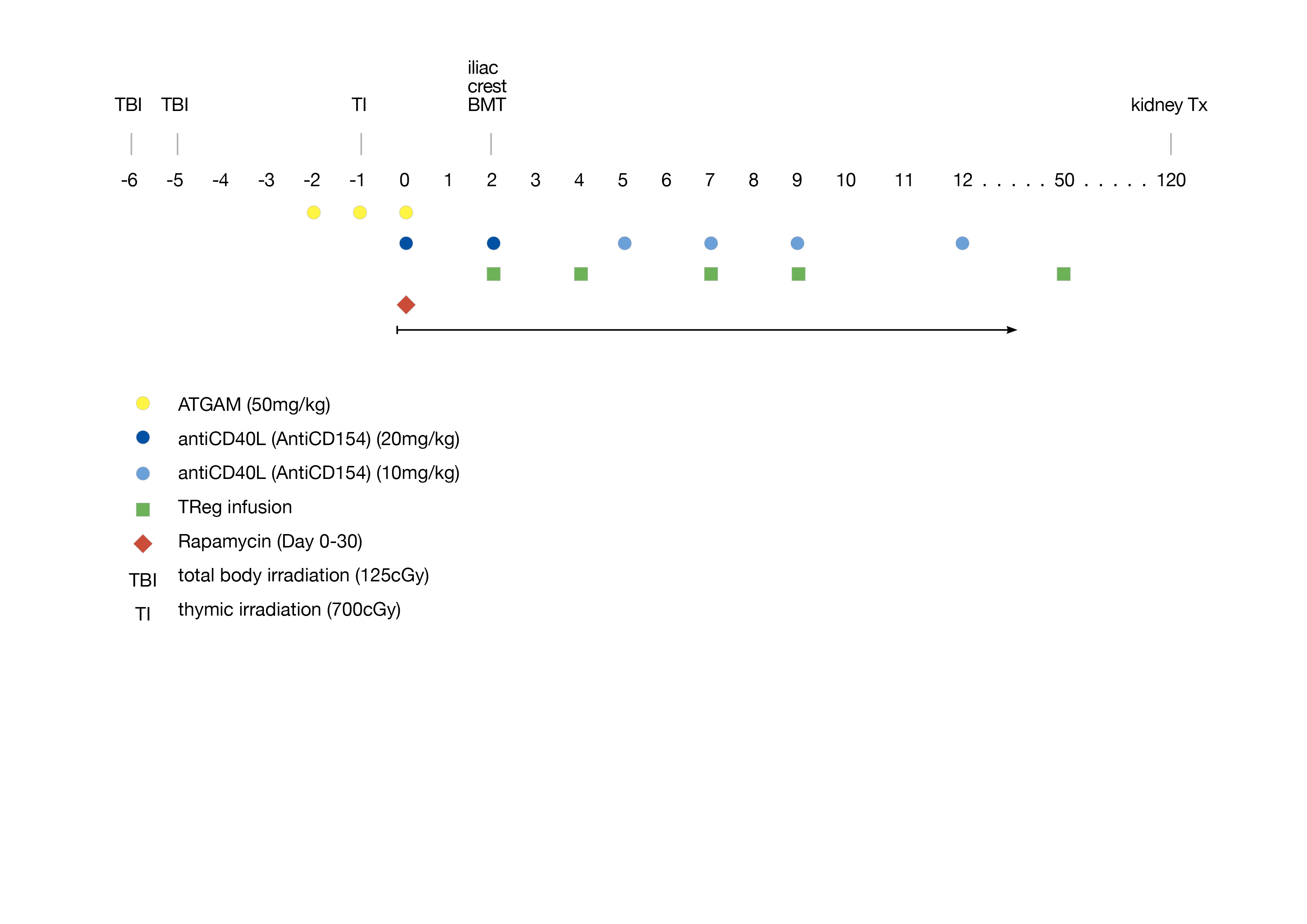Treg And Bone Marrow Infusion Promotes Survival Of Donor Kidney Grafted Months After Disappearance Of Mixed Chimerism
Columbia Center for Translational Immunology, Columbia University, New York City, NY
Meeting: 2019 American Transplant Congress
Abstract number: 374
Keywords: Kidney transplantation, Primates, T cells, Tolerance
Session Information
Session Name: Concurrent Session: Tolerance / Immune Deviation
Session Type: Concurrent Session
Date: Monday, June 3, 2019
Session Time: 4:30pm-6:00pm
 Presentation Time: 4:54pm-5:06pm
Presentation Time: 4:54pm-5:06pm
Location: Room 310
*Purpose: Transient mixed chimerism induced with non-myeloablative conditioning in monkeys and humans induces tolerance to about 70% of donor kidney grafts transplanted at the time of bone marrow transplantation. To improve the reliability of tolerance induction, we have infused polyclonally expanded recipient Tregs at the time of BMT. We have achieved prolonged but not permanent chimerism with this approach in cynomolgus macacques. To determine the robustness of tolerance, we waited 120 days before grafting donor kidneys, as such grafts are routinely rejected by animals receiving BMT without Tregs.
*Methods: Ex vivo expanded polyclonal recipient Tregs were grown from sorted (CD4+ CD25hi) PBMCs and cryopreserved. Conditioning includes total body irradiation (125cGy), thymic irradiation (7Gy), anti-CD154 mAbs, horse ATG, followed by allogeneic MHC-mismatched BMT and 1 month of rapamycin. 4 cynomolgous macaques received this protocol, of which two received Treg infusions.To test tolerance, donor kidney Tx was performed on day 120 after BMT without immunosuppression, after peripheral chimerism had been lost.
*Results: Transient peripheral blood macrochimerism was seen for 20 and 50 days after iliac crest BMT in 2 animals receiving Tregs. Kidney Tx in the two Treg recipients functioned for 35 days and >170 days without IS. In the longest survivor, MLR assays showed antidonor hyporesponsiveness that was restored in CD25-depleted MLR. Histopathologic analysis show no major signs of graft rejection 152 days after transplant. Kidney transplants are upcoming in two control animals.
*Conclusions: Administration of autologous ex vivo expanded Tregs in combination with iliac crest BMT results in prolonged survival of donor kidneys grafted after peripheral chimerism is lost. The addition of Tregs to the mixed chimerism protocol may allow for the induction of tolerance to kidneys even in the absence of permanent chimerism. Ex vivo expanded, polyclonal Tregs given at the time of BMT not only enhance donor chimerism but may induce a regulatory environment that is associated with robust operational tolerance to the donor.
To cite this abstract in AMA style:
Bruestle K, Alonso-Guallart P, Lopes E, Pierre G, Llore N, Sakai H, Kofman S, Ekanayake-Alper D, Sykes M, Griesemer A. Treg And Bone Marrow Infusion Promotes Survival Of Donor Kidney Grafted Months After Disappearance Of Mixed Chimerism [abstract]. Am J Transplant. 2019; 19 (suppl 3). https://atcmeetingabstracts.com/abstract/treg-and-bone-marrow-infusion-promotes-survival-of-donor-kidney-grafted-months-after-disappearance-of-mixed-chimerism/. Accessed February 9, 2026.« Back to 2019 American Transplant Congress

